Active living
Intimate area skin irritation: adult nappy rash causes & relief
Have you noticed redness, itching or discomfort in the area where you usually wear incontinence pads and pants? These could be signs of intimate area skin irritation – a common issue that many people experience but rarely talk about, leading towards adult nappy rashes. (also known as Incontinence-Associated Dermatitis or IAD)
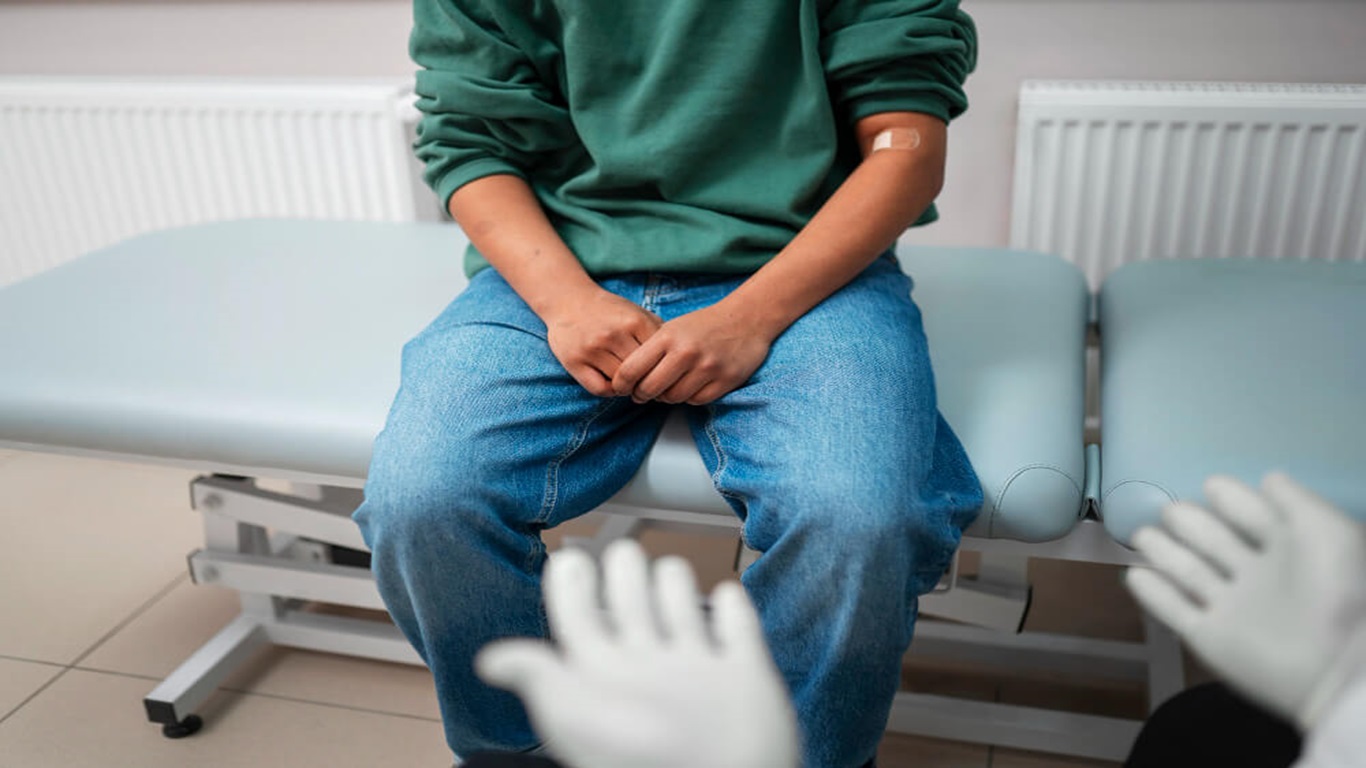
This type of skin irritation is more common than people think – and it’s not just linked to wearing pads or incontinence pants. In this article, we will explain what intimate area skin irritation is, its causes, and share practical tips on how you can treat and prevent it. Whether you’re managing incontinence or simply dealing with occasional skin discomfort, this guide will help you take care of your skin and feel more comfortable day-to-day.
Key points:
- Intimate area skin irritation can affect anyone, not just those wearing MoliCare® adult incontinence products.
- Common triggers include wetness, chafing, allergies or fungal infections.
- It often starts as red, itchy skin but can worsen if ignored.
- Regular cleaning, using barrier creams and properly fitting products can help.
- It is important to consult a healthcare professional if the rash doesn’t quickly improve with some additional skincare.
Intimate area skin irritation
- Sources
- What is an adult nappy rash
- What are the symptoms of intimate area skin irritation
- What causes intimate area skin irritation and nappy rash in adults?
- Can skin irritation happen if you do not use absorbent products?
- When to seek professional advice
- HARTMANN Direct & MoliCare Support you can trust
- FAQs
What is an adult nappy rash?
Intimate area skin irritation refers to redness, itching, soreness or discomfort in the skin that can appear around the groin, buttocks or inner thighs [otherwise known as adult nappy rash in some regions]. Some people describe it as a burning, stinging or tight sensation.
The condition is commonly linked with incontinence, but it’s not exclusive to those who wear pads or other absorbent underwear. It can affect anyone if the skin is exposed to prolonged moisture, friction, poor hygiene or irritating products.
What are the symptoms of intimate area skin irritation?
Symptoms vary depending on the cause and how long it has been left untreated. You might notice just a small pink patch at first, but it can rapidly get worse.
Mild symptoms may include:
● Red or pink skin
● Dry patches or tiny bumps
● Itching or irritation
● General discomfort when moving or sitting
More serious symptoms may include:
● Raw, broken or burnt-looking skin
● Painful stinging or burning sensations
● Hot or inflamed skin
● Oozing, bleeding or open sores
● Pain when urinating or opening bowels

What causes intimate area skin irritation and nappy rash in adults?
Skin irritation in the intimate area is often the result of several contributing factors – typically a combination of moisture, heat, pressure, and friction. Below are some common causes:
1. Moisture and prolonged wetness
Urine against the skin from poor quality incontinence products is one of the most common causes. When skin is in constant contact with urine, sweat or faeces, its natural protective barrier starts to break down. The longer the area stays damp, the more likely it is to become irritated and sore. Loose stools and diarrhoea can also speed up this process because faeces is more acidic and damaging than urine. We recommend MoliCare® pads which have SkinGuard® Absorbent Core Technology built in to keep skin feeling dry and neutralise urine to a balanced pH.
2. Chafing and friction
Friction from tight clothing, pads that don’t fit well, or the skin rubbing against itself can all contribute towards irritated skin. This kind of rubbing damages the top layer of skin, leaving it more vulnerable to moisture and bacteria. Chafing is particularly common in warmer weather or when sitting down for long periods. Always choose incontinence products that are a comfortable, close fit and are made from soft materials such as MoliCare®.
3. Lack of airflow to the skin
When the skin is constantly covered – whether by tight clothing, plastic-backed incontinence products, or absorbent pads – it may not get enough air. This warm, enclosed environment traps heat and moisture against the skin, increasing the risk of irritation, rashes and even infection. Choosing breathable, cotton-based clothing and air-permeable incontinence products can help improve ventilation and reduce irritation.
4. Poor hygiene or cleaning habits
Clean the skin thoroughly after every product change – not just once a day – to reduce the risk of irritation. Leaving behind even small traces of urine or stool can lead to skin irritation, including urinary tract infections. Avoid harsh soaps or scrubbing too hard, as this can make things worse. Instead, stick to lukewarm water and a mild, non-perfumed cleanser whenever possible. Use MoliCare® skin care products designed for use in intimate areas and gentle on skin.
People with limited mobility or difficulty managing their own hygiene may be more vulnerable to skin irritation, especially if regular cleaning is delayed or overlooked. In these cases, help from a carer or bathroom adaptations to make it easier for them to maintain a good level of hygiene can make a big difference.
5. Skin allergies and product sensitivities
Although less common, some incontinence pads and barrier creams can irritate the skin or block the pad from absorbing urine. If you’ve recently switched products and noticed a rash develop, it’s worth checking the ingredients and trying a different product. Hypoallergenic products and fragrance-free MoliCare® skin barrier creams are often the better choices for individuals with sensitive skin and won’t stop the pad from absorbing urine.
6. Infection
Warm and damp conditions are ideal for fungal and yeast infections to thrive. If your rash doesn’t clear up within a few days or starts to smell, crack or become shiny or swollen, it could be infected. These types of infections can happen even when hygiene is good, especially if the skin has already been compromised by irritation.
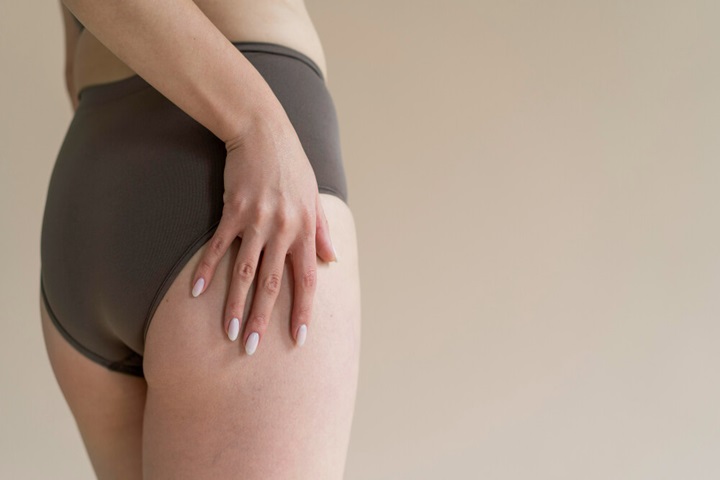
Can skin irritation happen if you do not use absorbent products?
Yes, absolutely. Tight-fitting clothes, sweating during exercise or staying in wet swimwear too long can all create the right conditions for skin irritation. So, even if you don’t wear absorbent products, skin irritation can still occur if the skin is regularly exposed to moisture and friction.
How to treat adult nappy rash and intimate area skin irritation
Gentle and prompt care can soothe the skin and support healing. Follow these simple steps:
Choose MoliCare products which are crafted from high quality materials, are fast absorbing and neutralise urine to a balanced pH.
Gently clean the area using lukewarm water and MoliCare® mild, unscented soap skin cleansing foam or moist wipes. Avoid leaving any soap residue on the skin – rinse off with water.
Pat the area dry using a clean towel – avoid scrubbing or rubbing the rash.
Let the skin air-dry for a few minutes before putting on new pads and clothing.
Once the skin is fully dry, apply MoliCare® barrier cream to soothe and protect the skin from further irritation. What is a barrier cream?
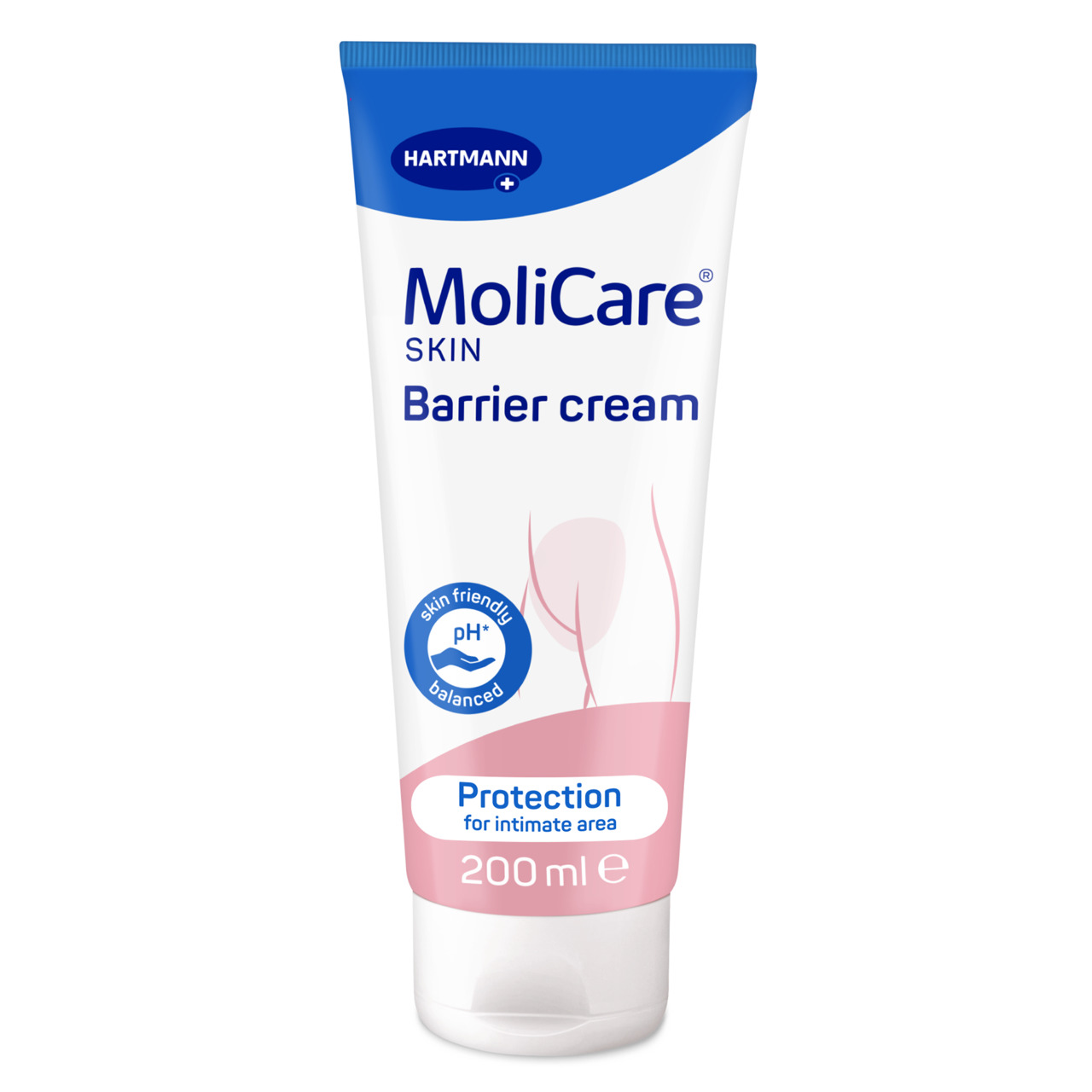
When to seek professional advice
Most rashes will clear up within a few days with some gentle skincare and the use of MoliCare® barrier cream, but there are times when it’s best to get a professional opinion. Contact a healthcare professional if:
The rash doesn’t improve after a few days or becomes more widespread.
It becomes more painful or swollen.
The skin-level rash turns into a deeper, open sore.
The area becomes hot to the touch.
You notice pus, oozing or bleeding.
You develop a fever or flu-like symptoms.
These are signs of an infection (bacterial or fungal) which may need prescription treatment. In this case, basic skincare may not be enough. Your healthcare professional might prescribe creams or tablets to clear the infection and prevent it from spreading.
For further information, you can also view the British Association of Dermatologist’s website.
Preventing skin irritation
Keeping the area clean, dry and well-ventilated is key to maintaining healthy skin. In addition to good hygiene and skincare directions mentioned above, consider the following tips to prevent a rash from returning:
Wear loose or breathable clothing to allow airflow to the area.
Don’t remain seated in the same position for too long. If possible, get up and move around to allow air movement to the area.
Change your absorbent pads and underwear once they are saturated or at least every 8 hours.
Make sure your incontinence product fits well – too loose, and it won’t protect you; too tight and it may rub. Consider opting for our MoliCare® fixpants, designed to hold pads in the right place.
If you do develop an area of irritated skin, early treatment is key. Don’t wait for it to get worse – early action can make a big difference.

HARTMANN Direct & MoliCare® – Support you can trust
Whether you’re looking for fast, gentle relief from intimate area skin irritation or looking to prevent it, HARTMANN Direct’s incontinence skincare range offers effective, gentle solutions you can rely on. Designed with your comfort in mind, MoliCare® products are breathable, skin-friendly and help reduce the risk of friction – ideal for managing leaks while keeping your skin protected.
In addition to high-quality products, Hartmann Direct offers expert advice on common concerns, such as how to stop urine leakage when coughing or the fastest way to get rid of a bladder infection. With discreet delivery and personalised support, you can feel confident every day.
FAQs
Can diet affect intimate area skin irritation?
Yes. Diets high in sugar and processed foods can contribute to yeast overgrowth, which may lead to fungal infections and worsen a rash. Staying hydrated and eating a balanced diet rich in fibre can also help reduce bowel irritation and improve skin health.
Is intimate skin irritation contagious?
A standard rash caused by irritated skin is not contagious. However, if it has led to a fungal or bacterial infection, the infection may be transmissible through skin contact, shared towels and bedding. For this reason, it is important to get the infection treated promptly.
Are there any lifestyle habits that increase the risk of intimate skin irritation?
Yes. Prolonged sitting, insufficient fluid intake (which can concentrate urine), infrequent changing of incontinence products and wearing tight clothing can all increase the risk.
Can shaving or grooming the area make the rash worse?
Yes. Shaving can create microtears or irritation that may worsen with friction, sweat or exposure to urine and faeces. If grooming, consider gentle methods and ensure proper aftercare.
Is talcum powder recommended for use in intimate areas?
No, talcum powder is not recommended due to potential health risks and the availability of safer, more effective alternatives for managing moisture, such as pads and barrier creams, which are already designed to keep moisture away from the skin. Talcum powder can interfere with the effectiveness of barrier creams, forming a paste-like residue that may trap bacteria or fungi, potentially exacerbating irritation.
Sources
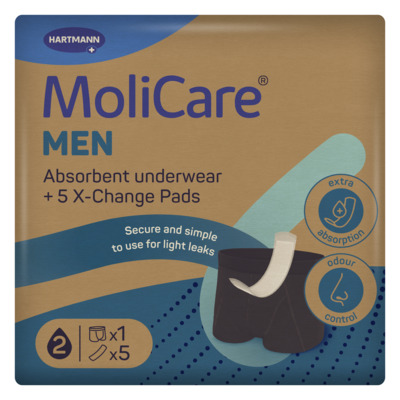 MoliCare® MEN Absorbent underwear + 5 X-Change Pads
<h3><strong>Men's washable incontinence pants with an invisible pad for extra protection</strong></h3>
<p>Feel confidently fresh all day with MoliCare® MEN Absorbent underwear with X-Change Pads. <br />
A discreet, simple-to-use solution for very light bladder weakness. Thanks to a special hidden pocket inside the underwear, you can easily insert a MoliCare X-Change Pad for extra protection which stays securely in place and is invisible. Just look for the layer of extra fabric inside the underwear and slip the pad into it for increased absorbency and security.<br />
With 4 layers of protection and a special leakproof technique MoliCare® MEN Absorbent underwear with X-Change Pads is designed to keep you feeling confident and dry for up to 12 hours*. The X-Change Pad converts liquid into gel to reliably lock away up to 25 teaspoons (approx. 125 ml) of urine and neutralise odours.<br />
The men’s washable incontinence pants are comfortable to wear and have a masculine, timeless design.<br />
Indistinguishable from normal underwear, 83%** of men say the product is a convincing alternative to conventional disposable products. There’s no need to change your underpants throughout the day, simply replace the exchangeable absorbent core whenever you need.<br />
*Hours will vary depending on amount of urine and individual bladder habits.<br />
**Internal test at Paul Hartmann AG, 12/2023, Top 2 Box, n= 16 men, Germany </p>
MoliCare® MEN Absorbent underwear + 5 X-Change Pads
<h3><strong>Men's washable incontinence pants with an invisible pad for extra protection</strong></h3>
<p>Feel confidently fresh all day with MoliCare® MEN Absorbent underwear with X-Change Pads. <br />
A discreet, simple-to-use solution for very light bladder weakness. Thanks to a special hidden pocket inside the underwear, you can easily insert a MoliCare X-Change Pad for extra protection which stays securely in place and is invisible. Just look for the layer of extra fabric inside the underwear and slip the pad into it for increased absorbency and security.<br />
With 4 layers of protection and a special leakproof technique MoliCare® MEN Absorbent underwear with X-Change Pads is designed to keep you feeling confident and dry for up to 12 hours*. The X-Change Pad converts liquid into gel to reliably lock away up to 25 teaspoons (approx. 125 ml) of urine and neutralise odours.<br />
The men’s washable incontinence pants are comfortable to wear and have a masculine, timeless design.<br />
Indistinguishable from normal underwear, 83%** of men say the product is a convincing alternative to conventional disposable products. There’s no need to change your underpants throughout the day, simply replace the exchangeable absorbent core whenever you need.<br />
*Hours will vary depending on amount of urine and individual bladder habits.<br />
**Internal test at Paul Hartmann AG, 12/2023, Top 2 Box, n= 16 men, Germany </p>
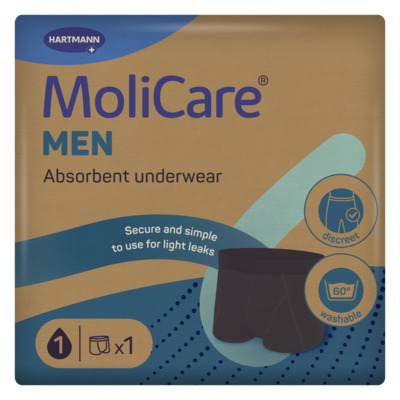 MoliCare® MEN Absorbent underwear
<h2><strong>Protective underwear for drips and dribbles in men</strong></h2>
<p>Get protection for men without the need for pads with MoliCare<sup>®</sup> Men Absorbent underwear. </p>
<p>Offering reliable leak protection, this washable men's underwear securely locks away urine thanks to its quick-dry technology. They look and feel exactly like your regular men’s boxers but with the subtle difference that they can hold up to 10 teaspoons of urine (50 ml). </p>
<p>Designed in Germany, MoliCare<sup>®</sup> Men underwear is dermatologically tested, free of harmful substances and Oeko-Tex 100 certified. Wash this men’s underpants for incontinence at 60° Celsius and use them again and again. </p>
<p><strong>Who is MoliCare<sup>®</sup> Men Absorbent underwear suitable for? </strong></p>
<p>MoliCare<sup>®</sup> Men underwear is for men who experience very light bladder weakness, resulting in small drops of spontaneous urine loss. The invisible men's bladder weakness pants are washable even at 60° Celsius, eliminating odour-causing bacteria.</p>
<p>Designed to look and feel like your normal underwear, they’re easy to put on and off.</p>
<h2><strong>Reusable and convenient solution for drips and dribbles</strong></h2>
<p>Don’t worry about dribbling after urination anymore. MoliCare<sup>®</sup> Men Absorbent underwear are discreet, washable men’s incontinence briefs offering a sustainable, comfortable and skin-friendly alternative to other hygiene products.</p>
<p>Indistinguishable from normal underwear, 87%* of men say the product is a convincing alternative to conventional disposable products.</p>
<p>Free of harmful substances, washable at 60° Celsius and suitable for tumble drying, MoliCare<sup>®</sup> Men Absorbent underwear combines leakproof protection and sustainability with a masculine, yet invisible design so no one will ever know you’re wearing washable incontinence pants. </p>
<p>* Internal test at Paul Hartmann AG, 12/2023, Top 2 Box, n= 16 men, Germany</p>
<p><strong>Caring for your reusable MoliCare<sup>®</sup> Men Absorbent underwear: a step-by-step guide</strong></p>
<ul>
<li>Wash before first use</li>
<li>Rinse out with cold water after use</li>
<li>Use a mild detergent to ensure underwear maintains its functionality. Do not use fabric softeners</li>
<li>Hygienically wash your MoliCare®Absorbent underwear at 60 °C</li>
<li>After washing you can tumble dry your underwear on a low heat</li>
<li>Following these steps will help your underwear stay fresh, clean and ready to wear</li>
</ul>
MoliCare® MEN Absorbent underwear
<h2><strong>Protective underwear for drips and dribbles in men</strong></h2>
<p>Get protection for men without the need for pads with MoliCare<sup>®</sup> Men Absorbent underwear. </p>
<p>Offering reliable leak protection, this washable men's underwear securely locks away urine thanks to its quick-dry technology. They look and feel exactly like your regular men’s boxers but with the subtle difference that they can hold up to 10 teaspoons of urine (50 ml). </p>
<p>Designed in Germany, MoliCare<sup>®</sup> Men underwear is dermatologically tested, free of harmful substances and Oeko-Tex 100 certified. Wash this men’s underpants for incontinence at 60° Celsius and use them again and again. </p>
<p><strong>Who is MoliCare<sup>®</sup> Men Absorbent underwear suitable for? </strong></p>
<p>MoliCare<sup>®</sup> Men underwear is for men who experience very light bladder weakness, resulting in small drops of spontaneous urine loss. The invisible men's bladder weakness pants are washable even at 60° Celsius, eliminating odour-causing bacteria.</p>
<p>Designed to look and feel like your normal underwear, they’re easy to put on and off.</p>
<h2><strong>Reusable and convenient solution for drips and dribbles</strong></h2>
<p>Don’t worry about dribbling after urination anymore. MoliCare<sup>®</sup> Men Absorbent underwear are discreet, washable men’s incontinence briefs offering a sustainable, comfortable and skin-friendly alternative to other hygiene products.</p>
<p>Indistinguishable from normal underwear, 87%* of men say the product is a convincing alternative to conventional disposable products.</p>
<p>Free of harmful substances, washable at 60° Celsius and suitable for tumble drying, MoliCare<sup>®</sup> Men Absorbent underwear combines leakproof protection and sustainability with a masculine, yet invisible design so no one will ever know you’re wearing washable incontinence pants. </p>
<p>* Internal test at Paul Hartmann AG, 12/2023, Top 2 Box, n= 16 men, Germany</p>
<p><strong>Caring for your reusable MoliCare<sup>®</sup> Men Absorbent underwear: a step-by-step guide</strong></p>
<ul>
<li>Wash before first use</li>
<li>Rinse out with cold water after use</li>
<li>Use a mild detergent to ensure underwear maintains its functionality. Do not use fabric softeners</li>
<li>Hygienically wash your MoliCare®Absorbent underwear at 60 °C</li>
<li>After washing you can tumble dry your underwear on a low heat</li>
<li>Following these steps will help your underwear stay fresh, clean and ready to wear</li>
</ul>
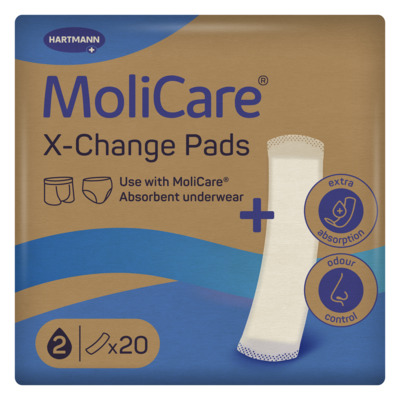 MoliCare® X-Change Pads
<h3><strong>Invisible underwear pads providing extra protection for MoliCare® Absorbent underwear</strong></h3>
<p>Enjoy that dry feeling for up to 12 hours* with MoliCare® X-Change Pads. <br />
Designed to add increased protection to MoliCare® Absorbent underwear, MoliCare® X-Change pads have a highly absorbent core that turns liquid into gel and neutralises unpleasant odours. The pad can hold up to 20 teaspoons (approx. 100 ml) of urine.<br />
Invisible due to the integrated pocket in MoliCare® Absorbent underwear, the pad stays in place and gives you the security of extra leakproof protection when you need it most. Just look for the extra layer of fabric inside the underwear and slip the pad into the pocket for increased absorbency and security against light bladder weakness. This unique concept is patented by HARTMANN.<br />
MoliCare® X-Change incontinence pads for underwear are easy to change and dispose of in public washrooms. Made to reduce disposable waste by 78 % compared to other incontinence products, they are free of silver chloride and other biocides that can have a negative impact on the intimate flora and environment.<br />
*Hours will vary depending on amount of urine and individual bladder habits.</p>
MoliCare® X-Change Pads
<h3><strong>Invisible underwear pads providing extra protection for MoliCare® Absorbent underwear</strong></h3>
<p>Enjoy that dry feeling for up to 12 hours* with MoliCare® X-Change Pads. <br />
Designed to add increased protection to MoliCare® Absorbent underwear, MoliCare® X-Change pads have a highly absorbent core that turns liquid into gel and neutralises unpleasant odours. The pad can hold up to 20 teaspoons (approx. 100 ml) of urine.<br />
Invisible due to the integrated pocket in MoliCare® Absorbent underwear, the pad stays in place and gives you the security of extra leakproof protection when you need it most. Just look for the extra layer of fabric inside the underwear and slip the pad into the pocket for increased absorbency and security against light bladder weakness. This unique concept is patented by HARTMANN.<br />
MoliCare® X-Change incontinence pads for underwear are easy to change and dispose of in public washrooms. Made to reduce disposable waste by 78 % compared to other incontinence products, they are free of silver chloride and other biocides that can have a negative impact on the intimate flora and environment.<br />
*Hours will vary depending on amount of urine and individual bladder habits.</p>
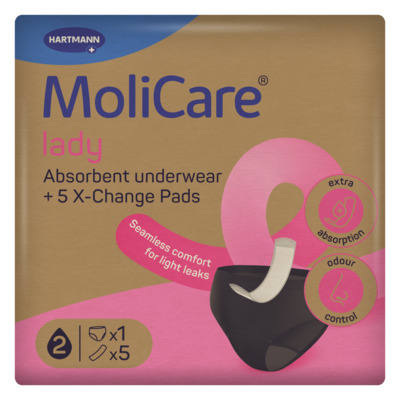 MoliCare® Lady Washable & Absorbent Underwear X-Change Pads
<h2>Why Choose MoliCare<sup>®</sup> washable bladder weakness underwear?</h2>
<p> </p>
<ul>
<li>Unique washable incontinence pants for ladies with a hidden pocket to insert MoliCare<sup>®</sup> X-Change Pads for extra protection</li>
<li>Versatile daily hygiene product for very light bladder weakness</li>
<li>In combination with the exchangeable X-Change Pads, these washable incontinence pants safely lock away up to 30 teaspoons (approx. 149 ml) of urine for a secure, dry feeling</li>
<li>Leakproof pant with a seamless and invisible design for maximum discretion</li>
<li>MoliCare<sup>®</sup> X-Change Pads provide reliable odour control and are easily inserted into the pants and changed as required</li>
<li>Hygienically wash the incontinence pants at 60°C, without the X-Change Pad</li>
<li>78% less plastic waste compared to conventional disposable incontinence products</li>
<li>Suitable for tumble drying</li>
<li>Free of silver chloride and other biocides that can negatively affect vaginal flora</li>
<li>Designed in Germany and made from soft, gentle-on-skin fabrics</li>
<li>This pack contains one pair of women's washable incontinence pants in Size M or Size L plus 5 X-Change-Pads</li>
<li>Designed in Germany and made from soft, gentle-on-skin fabrics</li>
<li>Medium size corresponds to EU size 40/42, or dress size 14-16</li>
</ul>
MoliCare® Lady Washable & Absorbent Underwear X-Change Pads
<h2>Why Choose MoliCare<sup>®</sup> washable bladder weakness underwear?</h2>
<p> </p>
<ul>
<li>Unique washable incontinence pants for ladies with a hidden pocket to insert MoliCare<sup>®</sup> X-Change Pads for extra protection</li>
<li>Versatile daily hygiene product for very light bladder weakness</li>
<li>In combination with the exchangeable X-Change Pads, these washable incontinence pants safely lock away up to 30 teaspoons (approx. 149 ml) of urine for a secure, dry feeling</li>
<li>Leakproof pant with a seamless and invisible design for maximum discretion</li>
<li>MoliCare<sup>®</sup> X-Change Pads provide reliable odour control and are easily inserted into the pants and changed as required</li>
<li>Hygienically wash the incontinence pants at 60°C, without the X-Change Pad</li>
<li>78% less plastic waste compared to conventional disposable incontinence products</li>
<li>Suitable for tumble drying</li>
<li>Free of silver chloride and other biocides that can negatively affect vaginal flora</li>
<li>Designed in Germany and made from soft, gentle-on-skin fabrics</li>
<li>This pack contains one pair of women's washable incontinence pants in Size M or Size L plus 5 X-Change-Pads</li>
<li>Designed in Germany and made from soft, gentle-on-skin fabrics</li>
<li>Medium size corresponds to EU size 40/42, or dress size 14-16</li>
</ul>
